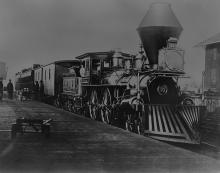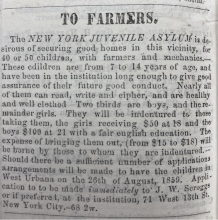 In the second half of the 19th century, welfare organizations on the East Coast were looking for ways to find homes for orphaned and homeless children. Their solution, beginning in 1854, was to send children to rural areas across the country, primarily the Midwest. Organizations such as the Children’s Aid Society and the New York Juvenile Asylum sent children by train to these areas, where they were placed in homes to work, often on farms, and to receive an education. These trains have since been labeled “Orphan Trains,” and many traveled to Champaign-Urbana and surrounding communities.
In the second half of the 19th century, welfare organizations on the East Coast were looking for ways to find homes for orphaned and homeless children. Their solution, beginning in 1854, was to send children to rural areas across the country, primarily the Midwest. Organizations such as the Children’s Aid Society and the New York Juvenile Asylum sent children by train to these areas, where they were placed in homes to work, often on farms, and to receive an education. These trains have since been labeled “Orphan Trains,” and many traveled to Champaign-Urbana and surrounding communities.
Among the approximately 200,000 children relocated by the Orphan Trains between 1854 and 1929 were Elizabeth and Annie McKenzie. New York Juvenile Asylum Annual reports from the early 1860s mention E. McM and A. McM. One report states, about the girls, “Father dead; mother intemperate; consented to let children go West; in Asylum about one year.” Though the reports anonymize the children, the Apprentice Indenture Records in the Champaign County Clerk records identify the sisters by name.
The McKenzie sisters were 8 and 9 years old upon their arrival to Champaign county in 1859. Both of the children were placed with members of the Busey family, who were early residents and prominent members of the community. Elizabeth Busey, the widow of Colonel Matthew W. Busey, took in Elizabeth in Urbana, and her son John S. Busey indentured Annie in Champaign. The indenture contracts state that both girls were to be instructed in the art of “housewifery.” The contracts were to expire when the children turned 18, at which time they would both be paid 50 dollars.

The New York Juvenile Report from 1861 provides updates on the McKenzie sisters according to the staff of the welfare organization. Annie McKenzie was “Doing finely; has a good home with a kind-hearted farmer; her sister lives but two miles distant with Mrs. Busey, mother of her employer. Saw her in November 1861.” As for Elizabeth, “Mrs. Busey says ‘she could not do without her;’ she was at first very much opposed to taking a child; the little girl is healthy, happy and perfectly contented; often visits her sister.—Saw her recently.” The report in 1864 gives further updates: “’A. McK. makes the best bread of any girl her age that I know of. She is only twelve.’ E. McK. is ‘a good girl, healthy and growing finely. Attends the High School and takes piano lessons.”
Though later New York Juvenile Asylum Reports do not mention the McKenzie sisters, there are county records pertaining to Elizabeth McKenzie years later. In 1878, when she was 28 years old, the Champaign County Court issued a verdict claiming her “insane and a fit person to be sent to the Illinois State Hospital for the Insane.” They also declared “that her insanity is of temporary duration, the cause of which is Self Polution[sic]” and “that she is a pauper.” A similar verdict was given two years later, in 1880, although this time, the cause of her insanity is listed as “not known.”
Elizabeth McKenzie was sent to Peoria State Hospital on December 8, 1904. She died on November 3, 1920, at the age of 70 at the hospital. According to the Death notice published in the Champaign News-Gazette, she left no relatives. The cause of death listed is “valvular disease of the heart.” Her death certificate also lists that she was a resident of the Champaign County Poor Farm, the site of which is now the Champaign County Nursing Home. Apart from her final 15 years at the state hospital, the duration of her stays in the hospital, and the poor farm are unclear.
Not all Orphan Train Riders experienced hardships such as Elizabeth’s, as many were happily incorporated into loving families and communities. Yet many others faced adversities such as abuse and poverty once they were brought west. We do not know how Elizabeth and Annie McKenzie felt about their new homes in Urbana and Champaign, and it remains unclear what happened to Elizabeth after her time with the Buseys. It is also unclear what happened to her sister Annie, as Elizabeth’s death announcement lists no relatives.
To find more information about the Orphan Trains, visit the Archives to view the Orphan Train Collection, which includes welfare organization annual reports as well as articles and notes specific to Champaign County’s Orphan Train Riders.
- Izzy Westcott
Archives Practicum Student
